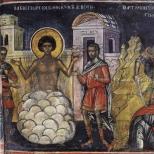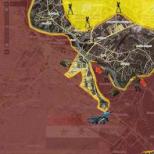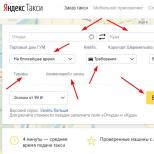Soviet Press Day May 5. Russian Press Day
Date in 2019: .
The holiday of newspapers and magazines is usually celebrated in January by the entire writing fraternity. After all, it is at the beginning of the year that Russia will celebrate Press Day - a holiday of paper media, a holiday of everyone who is in any way connected with the creation of periodicals.
Who's celebrating?
Humanity, in an effort to learn something new, is coming up with more and more new ways of transmitting information.

Information electronic systems inevitably come to the fore, pushing aside their predecessors. But nevertheless, paper media do not lose their relevance. Newspapers and magazines are not just nostalgia for the past, they are a whole art, which for some has become a favorite way of obtaining information - it’s so nice to rustle fresh leaves periodicals that still smell of printing ink.
For others, it has become the meaning of life. A whole armada of specialists in their field works on any newspaper, magazine, even with a minimum circulation. These include journalists, photojournalists, designers, proofreaders, and editors. And, of course, typesetters, layout designers, all the specialists responsible for the publication of a new copy.

It is these guys who will celebrate Russian Press Day in January 2017.
history of the holiday
The history of printing began at the beginning of the 18th century. Like many progressive ideas of that time, the decision to publish a printed newspaper belonged to Peter I. The newspaper was called “Vedomosti” and it was first published on January 13, 1703.

The purpose of this publication was to disseminate information about the reforms being carried out in the country. It was this event that later became the starting point when choosing the date of the holiday.
But the original version of the periodical holiday was associated with another important date. Press Day was immediately established in 1991 with a celebration date of May 5th. This was the date of publication of the first Soviet patriotic newspaper “Pravda” back in 1905.

But already at the end of 1991, by decision of the Presidium of the Supreme Council, both the number and name of the holiday were changed. Now, including in 2017, Russian Press Day is celebrated, and the date is dedicated to Peter the Great’s newspaper, January 13.
This number was more acceptable for the writing fraternity.

Since publishers and journalists celebrated their professional holiday in a close circle on January 13, long before the adoption official document, according to which the date was approved when Russian Press Day is celebrated.
Congratulations on Russian Press Day

On this wonderful day I would like to congratulate all printers on an amazing holiday. And even if your professions are not at the origins of human development, over 300 years they have been able to change the consciousness of millions. And today, how a person perceives the world and events depends on your work. So let the information provided by your publication always be accurate and truthful. And the sharpness of thought, global vision, accuracy of assessments and impartiality of judgments will become distinctive features your work. Happy holiday!
To all journalists, publishers, editors,
We will find words for everyone from the heart
Let's say you always write.
Happy holiday
Happy Printer's Day.
And heartfelt words
For any messenger.
Let your projects
They don't run out of ideas.
So that newspapers can
Make people happy.
Larisa, December 6, 2016.Mikhailov Andrey 05/05/2013 at 14:00
On May 5, the USSR celebrated Press Day. The date is not accidental: on this day the first issue of the then main newspaper of the country, Pravda, was published. The holiday was moved to winter, January 13, and called Russian Press Day. But for the majority of journalists writing and filming, May 5 remained their professional day. The online newspaper "Pravda.Ru" was created by Pravdists 14 years ago and, we hope, carries the best traditions of domestic journalism.
This year, on the occasion of the “old” Press Day, a significant event took place - “Pravda.Ru”, more precisely, its television group, became the laureate of the X International Film Festival of Marine and Adventure Films “The Sea Calls - 2013”, which ended the day before in St. Petersburg. In total, 54 films from filmmakers from 15 countries took part in the competition screening.
The film by the TV studio "Pravdy.Ru" "Secret Mountain" in the center of Siberia" won in the nomination "Best Screenplay". A special prize for our publication was provided by the leading Russian naval shipyard "Sevmash". The author and presenter of the film, which tells about the only in the world an underground plant where plutonium was produced for nuclear weapons - famous writer and science journalist, longtime contributor to Pravda.Ru Vladimir Gubarev.
According to the director of the festival, journalist and publicist, captain 1st rank Sergei Aprelev (by the way, also a long-time author of Pravda.Ru), the current anniversary film forum was dedicated to a number of significant dates: “The Year of Defense environment", announced by the Russian government, as well as the 70th anniversary Battle of Stalingrad and the 100th anniversary of the birth of the Hero Soviet Union A. I. Marinesko.
I would like to note that the international film festival "The Sea is Calling" is a long-term partner of the world's oldest Toulon Maritime Film Festival and the Strasbourg Underwater Image Festival. And the film from the television studio Pravda.Ru will also be shown at these famous international film forums. So we celebrate the holiday with significant labor achievements!
The author of these lines came to work for the electronic Pravda.Ru 11 years ago - one might say, a veteran of the publication. Admitting your love for an online newspaper, you see, is not entirely common. But I still confess! Over the years, Pravda.Ru has become near and dear to me, as, I am sure, to millions of readers.
On this holiday, it is appropriate to remember a funny incident that happened to me. It is in some way connected with the printed Pravda, which celebrates its 101st birthday on May 5th. All these years I have been working on the so-called remote access; the Internet doesn’t care where your office is or, in general, where you send materials from. The northern representative office of Pravda.Ru is, naturally, not in Moscow, but in the city of Severodvinsk. So, this incident took place in 2004, exactly during the gubernatorial election campaign in the Arkhangelsk region.
I mean, I’m sitting in the office, working for myself, and suddenly I hear phone call from the city veterans council. Like, we want to invite you, as a well-known representative of the central party newspaper, to our meeting. I'm scratching my head, I don't understand anything. The voice on the phone takes on pleading notes: they say, come, speak, it’s really, really necessary, people are waiting. Well, how can you refuse... I agreed, without even imagining what was in store for me. Who came up with this idea? Or maybe someone just wants to make fun of you? Affairs…
On the appointed day I come to the Palace of Culture - priests, and there is a full hall! The man who invited me to the performance comes up to me and leads me to the presidium (the table is set with red calico!). I’m starting to understand that something political is happening here. It soon turns out that I was at a meeting of city veterans with a gubernatorial candidate supported by the Communist Party. You understand that veterans traditionally love this party very much. Well, I'm in trouble... I fall into a daze, listening to the candidate - he seems to be a good guy. However, he was not elected then. I come to my senses when I hear: “And now the floor is given to the special correspondent of our favorite party newspaper Pravda!” - and applause. That's it. Apparently, no one explained to the old people that printed newspapers and electronic ones are not exactly the same thing, and Pravda.Ru is not that communist Pravda, but rather a successor of its creative, and not at all party, traditions . That's why I was invited.
Tribune. Hundreds of pairs of eyes. I think: I need to say something, otherwise... Are they telling jokes? And, I must say, at that time I was running such a humorous column in “Pravda.Ru”, “The Wardroom”, in which a variety of sea stories were published, funny incidents, funny stories. And before that, for many years he was responsible for filling the humorous section in the local city newspaper "Severny Rabochiy". Yes, in fact, he often performed on stage, it’s a common thing. Well, I started to “poison” humor, fortunately, my memory is good and my tongue is suspended. I watch the hall: the faces of the veterans are stony, there is obvious misunderstanding in their eyes. I keep my eye on the gubernatorial candidate. His hair stands on end, his eyes are stunned: they say, where did I end up?
But gradually the veterans’ eyes began to warm up, and laughter and clapping, modest at first, began to be heard in the hall. By the eighth sea bike (by the way, sent to the editorial office of Pravda.Ru by someone from Severodvinsk), the audience was already openly laughing. And this is understandable: marine humor has always been understandable and loved for the residents of the city of shipbuilders, where nuclear submarines are built. It is clear that most of the veterans present in the hall either served in the navy or built ships. Again I cross my gaze - and the candidate, it turns out, gets up from his chair indignantly and goes backstage. And no one in the hall pays attention to this! The veteran who invited me to the meeting makes a scary face: stop it. Where is it? There are still many funny stories about the sea, ships, fleet...
“A newspaper is a collective propagandist, a collective agitator and a collective organizer.”
IN AND. Lenin
By decision of the 6th All-Russian (Prague) Conference of the RSDLP (January 1912), in response to the desire of the workers to have their own daily newspaper, on April 22 (May 5), 1912, the first issue of the newspaper “Pravda” was published in St. Petersburg. Since 1914, this day has been celebrated as a holiday of the working press, and since 1922 – as Press Day.
The Pravda newspaper, founded by V.I. Lenin, became the most widespread and popular Soviet newspaper. Together with communist party she has come a long way in history in the struggle for victory socialist revolution, for building socialism, with her fiery words called for the defeat of the enemy during the years of the Great Patriotic War, mobilized for revival National economy, fulfilling the role of a collective agitator, propagandist, and organizer of workers.
"Pravda" was a mass daily legal workers' newspaper, the de facto organ of the Bolshevik Party (the central organ of the RSDLP was the newspaper "Social Democrat" in 1908-1917, published abroad and distributed illegally in Russia). When creating Pravda, the party relied on the experience of many illegal and legal newspapers: Iskra, Forward, Proletary, New life", "Star" and others.
The traditions of modern Russian journalism originated in the Soviet press, in the newspapers Pravda, Izvestia, Trud and many others, on Soviet television and radio channels. It was from them that the most famous modern journalists emerged, journalistic schools were formed, and it was in these groups that the date of May 5 has always been and remains Press Day.
One of the most important directions of Pravda is theoretical and propaganda work. Its pages revealed scientific basis party policies, the increasing of its role in the development of socialist society, problems of Marxist-Leninist theory, scientific and technological revolution, current tasks of increasing the efficiency of the Soviet economy, improving production management.
Its popularity is evidenced by the fact that, for example, in 1975 the newspaper was published with a total one-time circulation of 10.6 million copies and was printed simultaneously in 42 cities. Pravda was published in more than 120 foreign countries.
After the destruction of the USSR, with the support of the ruling regime, the Communist Party of the Russian Federation was created, which declared itself the heir of the CPSU and received the rights to publish the newspaper Pravda. Unfortunately, at present, as an organ of the Central Committee of the Communist Party of the Russian Federation, the publication is not a communist newspaper.
Soviet Press Day was celebrated until 1991. In the 90s of the 20th century, fighting against the “legacy of the USSR”, Boris Yeltsin introduced a new holiday - January 13 (on this day in 1703 in Russia, by decree of Peter I, the first issue of the first Russian newspaper Vedomosti was published). However, many journalists continue the Soviet tradition: they celebrate their professional holiday - Press Day - on May 5th to this day.
The journalistic collective “Iskra Pravda” is among them. Taking the best from those who, for the sake of a few lines in a newspaper with a watering can and a notepad, “walked for three days, did not sleep for three days,” puts at the forefront not a stupid statement of facts, but the quality of presentation of materials with interesting details and details, analyzes and gives the reader the opportunity express your point of view, constructively criticize and suggest ways to solve pressing Crimean problems that cause public resonance in the community. And if the authorities are trying in every possible way not to hear our mouthpiece, then “Iskra Pravda” is read and heard by the people!
Confirmation of this is the huge editorial mail, hundreds of letters and articles to the newspaper. And what kind of authors, staff correspondents and freelance correspondents our Iskra Pravda has!
The publication of the Crimean Republican Branch of the COMMUNIST PARTY COMMUNISTS OF RUSSIA “Iskra Pravdy” is the only communist, brave, opposition newspaper in Crimea.
Keep it up, dear colleagues!
Our cause is right!
Happy holiday to you, Happy Soviet Press Day!
Bureau of the Crimean Republican Committee of the Communist Party of Russia Communists
Nowadays, Russian Press Day is celebrated on January 13. Until 1991, the holiday was celebrated in the USSR on May 5: the day the first issue of the Pravda newspaper was published.
In 1991, Press Day was moved, received a new name, and a different reason was chosen for celebration - the day of publication of the first Russian-language printed newspaper, Vedomosti, founded by decree of Peter I.
Organ of the Pskov Provincial Committee V.K.P. (b) - the magazine “Sputnik Bolshevika” No. 4 for 1927 calls on Komsomol members and Bolsheviks to celebrate Press Day in a significant year - 10 years of the existence of the newspaper “Pravda” and the Soviet press in general.
Building a new life requires the involvement of the broad masses, and the press is the most important tool to achieve the goal. The magazine touches on many political and everyday topics, but we will look at the section that teaches how to celebrate Press Day. It is entitled very specifically “How to do it?” and contains clear ideological guidelines and an action plan.
The plan for holding “Press Day” was adopted at a meeting of the secretariat of the Pskov Provincial Committee of the All-Union Communist Party (Bolsheviks) and recorded in protocol No. 26/30.
The tasks of the Bolsheviks come first.
Ideological: explaining to the worker-peasant masses the importance of the press in the struggle of the working class; identifying the significance of the press in the areas of state, economic and cultural construction; involving the masses in socio-political life through the press (creating a network of people's correspondents, holding reader conferences, etc.)
What does the sponge committee offer for celebration? Meetings! To reach the masses as widely as possible! They should take place in teams and trade unions, clubs and circles of various directions. Rural, urban and industrial newspapers should publish a selection of holiday materials and instructions for celebrating the holiday at the local level. 
The dates have been determined: May 5 in the city, May 15 in the village; so that the leaders of the party and Komsomol have time to take part in more festive meetings and meetings.
They should present historical, explanatory and reporting reports from the editorial boards of wall newspapers and editorial offices. The meetings should be accompanied by various cultural events.
Editorial boards of newspapers at any level must conduct reports and re-elect the leadership.
Two important points incentives: bonuses for successful publications and outbound sales - to bring printed products closer to the reader.
“Izboy-reading room” and wall newspaper modern man You won’t be surprised yet, but the party line, workers’ correspondent or workers’ correspondent in general, the rural movement already seem exotic.
The instructions for holding the holiday conclude with the instruction: “to all Ukoms and District Committees of the All-Union Communist Party, submit a full report on the results of the press day to the APO of the Provincial Committee of the All-Union Communist Party by June 10.”
Next, the magazine publishes almost bibliographic material - a list of books and articles “What to read about printing.” The headings are “History of the workers’ press”, “History of the capitalist press”, “Rural movement”, and among the authors are Zinoviev, Ryklin, Bonch-Bruevich. The information received will arm the Bolshevik with knowledge and arguments for disputes with his still backward comrades.
The block dedicated to the celebration of Press Day ends with a rather long document, “Resolution of the 3rd Regional Meeting of Workers’ Correspondents on the Organizational Issue.” Military correspondents and cadets were also present there. A meeting of workers and rural correspondents finds that voluntary associations are working rather weakly; it is necessary to intensify actions, increase social significance, and expand their membership. The meeting warns against being carried away by the appearance and embellishment of wall newspapers and attracting alien, self-important elements into one’s ranks.
Among the measures aimed at promoting the ideas of the party to the masses, and in connection with the increasingly complex global situation, it is proposed to increase the sense of responsibility of social activists, protect workers who are prevented from working, conduct training and political information, fight for the quality of materials (for example, the fight against cheating), and most importantly – expansion of the movement and explaining to the masses the importance of the work carried out by the workers’ movement.
Sources:
- Bolshevik's Companion: organ of the Pskov Provincial Committee of the V.K.P.(b). No. 4 (67): April / resp. editor Stepanov, editorial board: Gaiduk, Logvinsky, Turchin, Markin. - Pskov: Publication of the Pskov Provincial Committee of the V.K.P.(b), 1927. - 44 p. >>>
- Collection "Periodicals 1917-1941 in the electronic library
The professional holiday of media workers was first established in the USSR. Soviet Press Day was celebrated on May 5 to commemorate the publication of the first issue of the mass newspaper Pravda in 1912.
In December 1991, it was decided to move Press Day from May 5 to January 13, timed to coincide with the publication of the first Russian printed newspaper Vedomosti in Moscow on that day.
On December 26, 1702, Peter I issued a decree establishing the first newspaper to “notify it about foreign and domestic incidents...”. It is based on handwritten sheets of “Message Letters, or Chimes,” published since 1621. They were compiled in the Ambassadorial Prikaz specifically for the Tsar and courtiers based on materials from foreign publications. The first issue of the new newspaper, published in Moscow on January 13, 1703, bore the title: “Report on military and other affairs worthy of knowledge and memory that happened in the Moscow State and in other surrounding countries.”
The newspaper reported on the successes of the Russian army, the development of the fleet, the expansion of trade, the newly discovered ore deposits and the construction of factories. Information from foreign newspapers was also published. Peter I edited the first issues of Vedomosti himself, and subsequently was one of its main correspondents.
Initially, the newspaper was published at the Printing Yard in Moscow. The text was usually typed in one column without headings; to save space, almost no margins were left. Until 1710, Vedomosti was published in Church Slavonic font; later it was replaced by civil font, and at the same time the newspaper began to be decorated with engravings. The first editor of Vedomosti was the director of the Moscow Printing House Fyodor Polikarpov. And the first Russian reporter can be considered Yakov Sinyavich, who, by order of the tsar, covered the chronicle of court life.
In 1703-1704, 39 issues of Vedomosti were published, and in 1705 - already 46. The newspaper format was set at 1/8 sheet, but individual issues were printed on the whole. Externally, the newspaper looked like a small book ranging from 2 to 22 pages. Its name has changed several times - “Vedomosti”, “Moscow Vedomosti”, “Russian Vedomosti”, “Relation”, etc.
Since 1711, Vedomosti was published alternately in Moscow and St. Petersburg. After the death of Peter I in 1727, publication of the newspaper was stopped. But a year later, the St. Petersburg Gazette began to be published, one of the editors of which was M.V. Lomonosov. Publication of the newspaper was discontinued in 1917. IN modern Russia The publication with the name "Vedomosti" has been published since 1999. This is a business newspaper with a total circulation of about 70 thousand copies.
By the beginning of the twentieth century, 916 newspapers and 1,351 magazines were already published in Russia. In 1904, the first state agency was created in Russia - the St. Petersburg Telegraph Agency (the historical predecessor of ITAR-TASS).
After 1917, there were 884 newspapers and 753 magazines in Russia. With each decade, the number of printed publications increased: in 1940, 1822 magazines and 8806 newspapers were published, in 1989 - 5295 magazines and 8532 newspapers.
In the 1990s, the publishing industry was in decline. However, in Lately The number of media in the country is growing. According to Rospechat, today about 100 thousand funds are registered in Russia mass media, of which about 40 thousand are newspapers, 16 thousand are electronic media. Among the leaders in the ranking of the most cited publications in 2013 are still such newspapers as "Vedomosti", "Izvestia", " Russian newspaper", "Moscow's comsomolets", " TVNZ", "Arguments and Facts".
The profession of a journalist remains one of the most dangerous, both in peacetime and in war time. During the Great Patriotic War, 1,500 war correspondents were killed. The exact number of journalists killed in Afghanistan is unknown. In Chechnya, 25 journalists were killed during military operations. According to the Glasnost Defense Foundation, 4 Russian journalists died in 2013.
In days professional holiday Traditionally, annual journalistic awards are presented, in particular, awards from the President of the Russian Federation in the field of media and grants to support the most significant creative projects young journalists.
January 13 is considered for media workers special holiday. And although it is officially called Russian Press Day, it is celebrated not only by journalists from print publications, but also by television and radio companies, as well as online media.





